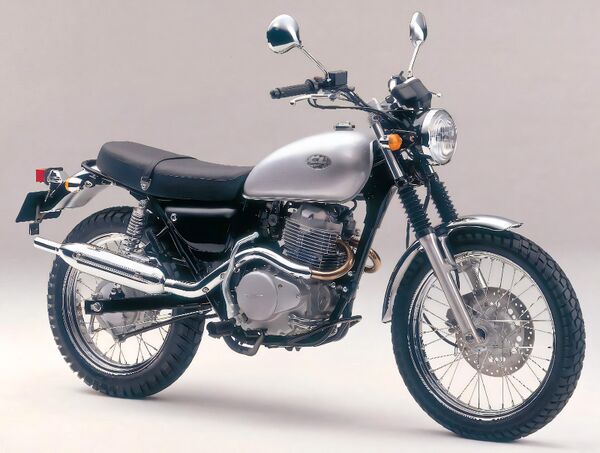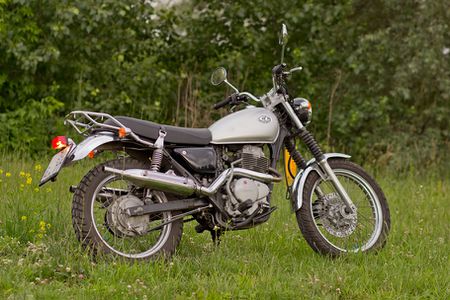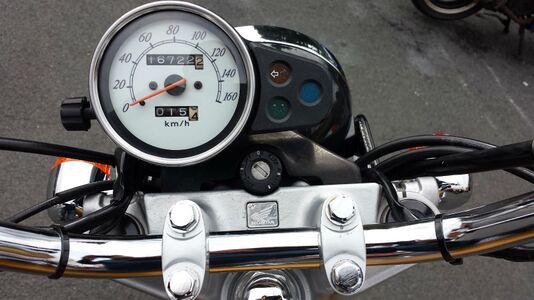Difference between revisions of "Honda CL400"
m |
m |
||
| (5 intermediate revisions by the same user not shown) | |||
| Line 1: | Line 1: | ||
{{DISPLAYTITLE: Honda CL400}} | {{DISPLAYTITLE: Honda CL400}} | ||
| + | {{#seo: | ||
| + | |keywords={{PAGENAME}}, review, specs, owners manual, service manual, guide | ||
| + | |og:image=https://en.enduro.team/images/7/7c/Cl-400_1998_1.jpg | ||
| + | }} | ||
__notoc__ | __notoc__ | ||
| − | [[file: Cl-400 1998 1.jpg | | + | [[file: Cl-400 1998 1.jpg | 600px | center | Honda CL 400]] |
The model of the retro-classic motorcycle Honda CL 400 was presented in 1997 at the Tokyo Motor Show, and went into series since September 23, 1998. The concept of the model was quite simple - to present to the market a motorcycle with classic shapes, perfect for both city and country trips. The model was based on a 1-cylinder 4-stroke air-cooled engine with a volume of 397 cc. see, issuing 29 hp. power and 34 Nm of torque. The engine was developed in 1985 and subsequently put on the enduro [[Honda_XR400 | Honda XR 400]]. | The model of the retro-classic motorcycle Honda CL 400 was presented in 1997 at the Tokyo Motor Show, and went into series since September 23, 1998. The concept of the model was quite simple - to present to the market a motorcycle with classic shapes, perfect for both city and country trips. The model was based on a 1-cylinder 4-stroke air-cooled engine with a volume of 397 cc. see, issuing 29 hp. power and 34 Nm of torque. The engine was developed in 1985 and subsequently put on the enduro [[Honda_XR400 | Honda XR 400]]. | ||
{{Ads_top}} | {{Ads_top}} | ||
| + | |||
| + | ''' Main competitors: ''' | ||
| + | * [[Kawasaki_W400 | Kawasaki W400]] | ||
| + | * [[Yamaha_SR400 | Yamaha SR400]] | ||
| + | |||
Of the features of the Honda CL 400, it should be noted a steel half-duplex frame, a kick starter, a dry sump lubrication system, classic suspensions in the form of a conventional telescopic fork and double shock absorber, rear drum brakes, a 5-speed gearbox and large spoked wheels with 19 'and 18' ... | Of the features of the Honda CL 400, it should be noted a steel half-duplex frame, a kick starter, a dry sump lubrication system, classic suspensions in the form of a conventional telescopic fork and double shock absorber, rear drum brakes, a 5-speed gearbox and large spoked wheels with 19 'and 18' ... | ||
The Honda CL 400 was designed primarily for the Japanese market, which is why this motorcycle is widely represented at Japanese auctions. The model was produced until 2001, after which it was discontinued and replaced by the [[Honda_CB400SS | Honda CB400SS]]. Like most other retro models, the Honda CL 400 is actively used as the basis for building custom. | The Honda CL 400 was designed primarily for the Japanese market, which is why this motorcycle is widely represented at Japanese auctions. The model was produced until 2001, after which it was discontinued and replaced by the [[Honda_CB400SS | Honda CB400SS]]. Like most other retro models, the Honda CL 400 is actively used as the basis for building custom. | ||
| − | |||
| − | |||
| − | |||
| − | |||
== Photos == | == Photos == | ||
| − | + | <gallery mode="packed" heights=200px> | |
| − | + | File:14327887268 a9f8e2b2ec o.jpg| | |
| − | + | File:Honda-cl400-8.JPG| | |
| − | + | </gallery> | |
| − | |||
| − | |||
{{Ads_feed}} | {{Ads_feed}} | ||
{{ads_post}} | {{ads_post}} | ||
Latest revision as of 13:07, 27 June 2023
The model of the retro-classic motorcycle Honda CL 400 was presented in 1997 at the Tokyo Motor Show, and went into series since September 23, 1998. The concept of the model was quite simple - to present to the market a motorcycle with classic shapes, perfect for both city and country trips. The model was based on a 1-cylinder 4-stroke air-cooled engine with a volume of 397 cc. see, issuing 29 hp. power and 34 Nm of torque. The engine was developed in 1985 and subsequently put on the enduro Honda XR 400.
Main competitors:
Of the features of the Honda CL 400, it should be noted a steel half-duplex frame, a kick starter, a dry sump lubrication system, classic suspensions in the form of a conventional telescopic fork and double shock absorber, rear drum brakes, a 5-speed gearbox and large spoked wheels with 19 'and 18' ...
The Honda CL 400 was designed primarily for the Japanese market, which is why this motorcycle is widely represented at Japanese auctions. The model was produced until 2001, after which it was discontinued and replaced by the Honda CB400SS. Like most other retro models, the Honda CL 400 is actively used as the basis for building custom.
Photos
Specifications
Specifications Honda CL 400:
| Model | Honda CL400 |
|---|---|
| Motorcycle type | retro classic |
| Release year | 1998-2000 |
| Frame | steel semi-duplex |
| Engine type | 1-cylinder, 4-stroke |
| Working volume | 397 cm³ |
| Bore / stroke | 85.0mm x 70.0mm |
| Compression ratio | 8.8: 1 |
| Cooling | air |
| Number of valves per cylinder | OHC, 4 valves |
| Fuel supply system | carburetor, 1x Keihin (VEBA) |
| Ignition type | CDI |
| Maximum power | 29 hp (21.0 kW) at 7000 rpm |
| Maximum torque | 34 Nm (3.5 kg * m) at 5500 rpm |
| Gearbox | 5-speed |
| Drive type | chain |
| Front tire size | 90 / 100-19 (55P) |
| Rear tire size | 110 / 90-18 (61P) |
| Front brakes | 1 disc, 2-piston caliper |
| Rear brakes | drum |
| Front suspension | telescopic fork (no adjustment) |
| Rear suspension | linkage, with double shock-absorber |
| Length | 2175 mm |
| Width | 825 mm |
| Height | 1135 mm |
| Wheelbase | 1410 mm |
| Saddle height | 795 mm |
| Minimum ground clearance | 185 mm |
| Maximum speed | 162 km / h |
| Fuel tank capacity | 12.0 l |
| Motorcycle weight | 140 kg - dry
155 kg - equipped |
Fuel consumption
The officially declared fuel consumption of the Honda CL 400 is 2.77 liters per 100 km (60 km / h, flat road). The actual value depends on the riding style.
Documentation


